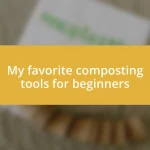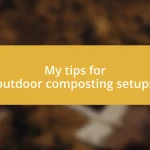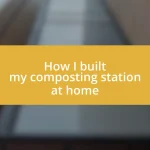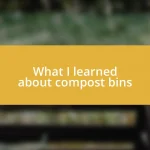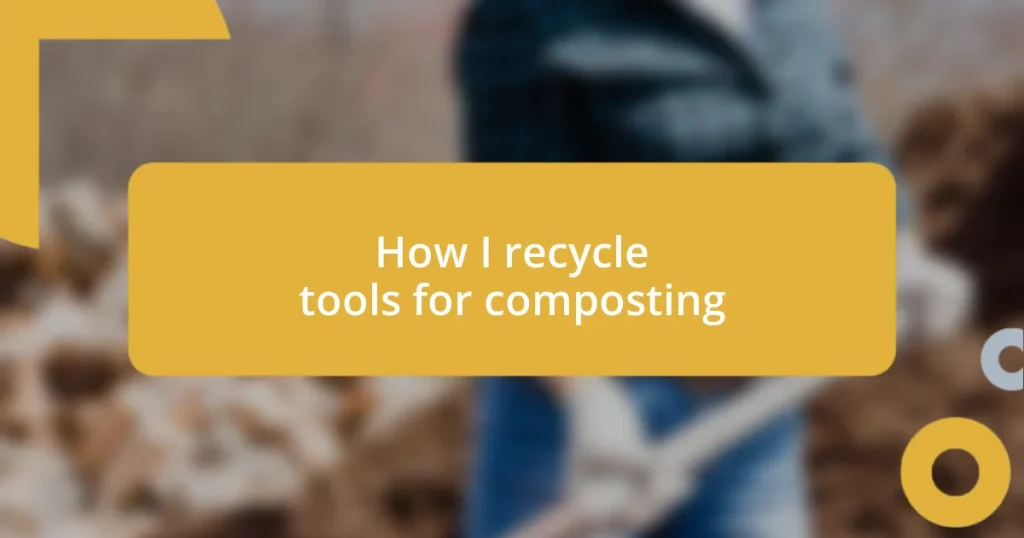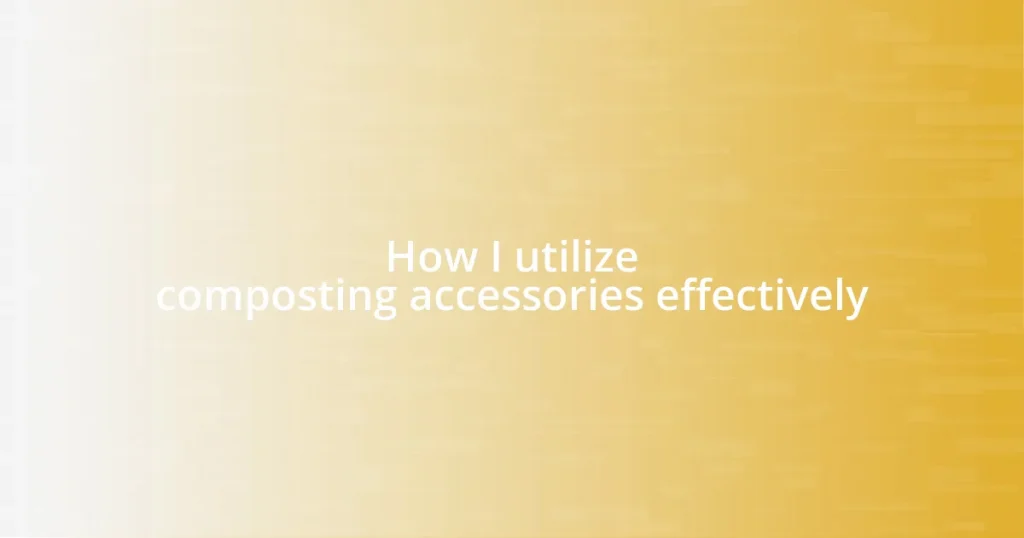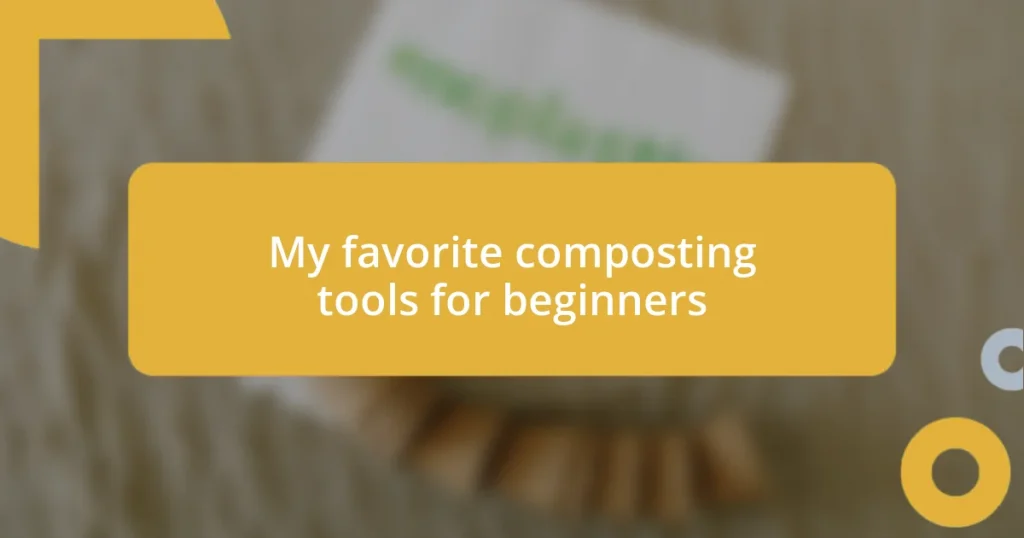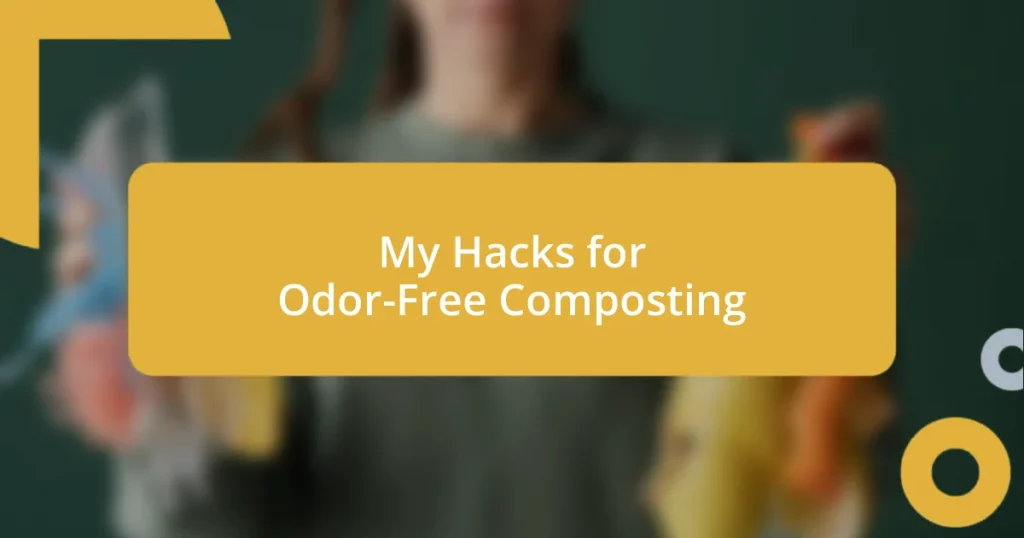Key takeaways:
- A sturdy pitchfork and a compost thermometer are essential tools for effective composting, enhancing decomposition and monitoring temperatures.
- Preparing tools for recycling includes cleaning, inspecting for damage, and considering upcycling before final recycling.
- Techniques for recycling include donating usable tools, repurposing them into garden art, and using wooden tools creatively in the garden.

Identifying tools suitable for composting
When it comes to identifying tools suitable for composting, I often think about how my own composting journey began with just a simple pitchfork. It may seem basic, but let me tell you, the right tool can make all the difference. A sturdy pitchfork is essential for aerating your compost pile, which enhances decomposition and keeps odors at bay. Have you ever struggled to turn your pile with a flimsy tool? Trust me, it’s not just frustrating; it can be a real game-changer for your compost’s health.
Another consideration is the kind of container you use to collect kitchen scraps. I found that a kitchen compost bin with a carbon filter does wonders in minimizing odors. It’s small enough to keep on your countertop, making it handy for daily use, while also being large enough to hold several days’ worth of scraps. Remembering to keep your greens and browns balanced is key, so having a tool with clear measurements can really help track what you’re adding.
Lastly, I can’t stress enough the importance of a reliable compost thermometer. Initially, I didn’t think it was necessary, but without it, you could miss the chance to optimize your compost’s temperature for perfect breakdown. Have you ever felt that rush of joy checking temperatures and realizing your compost is thriving? It’s a rewarding experience that brings a tangible connection to your gardening efforts. Finding tools that resonate with you can transform composting from a chore into a gratifying hobby!

Preparing tools for recycling process
Preparing your tools for the recycling process is crucial. I like to think of it as giving my tools a second life. Just like how I take time to declutter my living space, I ensure my composting tools are clean and functional before recycling them. It’s a satisfying step to know I’m not only promoting sustainability but also clearing away the old to make room for something new.
Here are some steps I follow that you might find helpful:
- Clean the tools: Remove any dirt, food residue, or organic matter.
- Inspect for damage: Check for rust or cracks that could affect functionality.
- Disassemble when possible: This helps in sorting the materials properly during recycling.
- Research local recycling guidelines: Find out what materials can be recycled in your area.
- Consider upcycling: Some tools might be repurposed creatively before recycling altogether.
Taking these steps not only prepares the tools for recycling but also gives me a sense of accomplishment. There’s something gratifying about giving my old tools a proper send-off, just like saying goodbye to an old friend.

Techniques for recycling metal tools
When it comes to recycling metal tools, I’ve discovered a few techniques that really make a difference. First, I often think about donating tools that are still in good working condition. Last summer, I was pleasantly surprised when I dropped off some old metal gardening tools at my local community garden. The smiles on their faces reminded me that these tools can contribute to something greater, providing value in the hands of fellow gardening enthusiasts.
Another technique I appreciate is repurposing metal tools into garden art. For example, an old shovel can be transformed into a trendy plant holder by simply bending it into shape. I’ve watched a friend create an entire sculpture from tools headed for the scrap pile, proving that creativity knows no bounds. This method not only recycles but also breathes new life into these tools, making them a conversation starter in any garden.
Lastly, I can’t stress enough the importance of encouraging others to recycle metal tools. When I shared my own recycling journey with my neighbors during a potluck, many expressed interest in starting their own projects. By sharing these techniques and experiences, we can create a community that values sustainability and resourcefulness—something that’s truly empowering!
| Technique | Description |
|---|---|
| Donation | Donate usable tools to community gardens or local groups. |
| Repurposing | Create unique garden art or functional items from old tools. |

Ways to recycle wooden tools
One of my favorite ways to recycle wooden tools is by transforming them into unique garden markers. I recall a rainy afternoon I spent painting names on rustic wooden stakes, which I then placed in my herb garden. Every time I glance at those markers, it feels like I’m reconnecting with nature in a personal way. Plus, isn’t it rewarding to create something beautiful while reducing waste?
Another method I enjoy is turning old wooden handles into plant supports or trellises. A few months ago, I found a broken rake handle in my shed. Instead of discarding it, I affixed it vertically in my garden to support climbing peas. It seems simple, but watching my plants thrive on that reclaimed support brings me a sense of achievement.
Lastly, I often incorporate wooden tools into my compost bin itself. While I wouldn’t toss just any tool in there, old, untreated wooden items can break down over time and enrich the compost. I learned this technique after doing some research, and it felt thrilling to recycle in such a practical way. What could be better than knowing I’m giving back to the soil?

